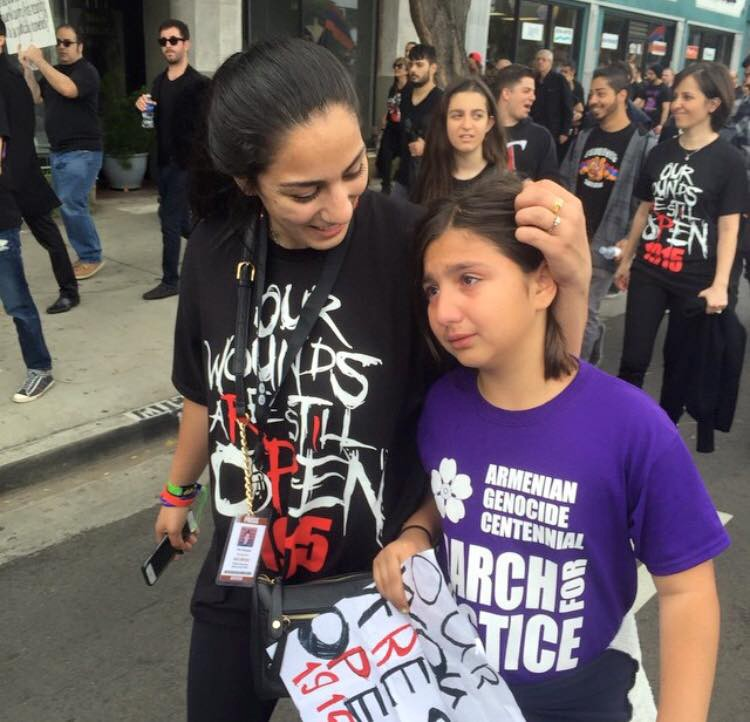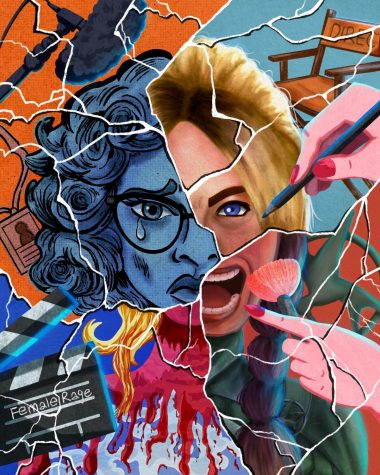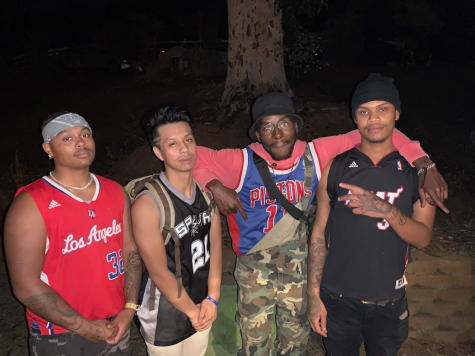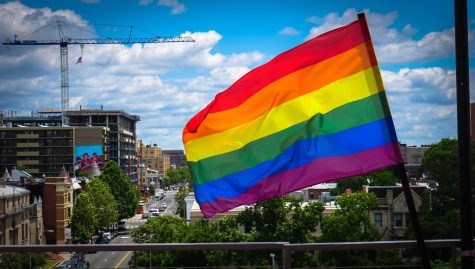More Than Just A Movie
“The Promise,” from the perspective of an Armenian-American…
I walked into theater three of the ArcLight Cinema in Pasadena, California, thankful to finally be seated after a mishap with our tickets and a parking nightmare that caused my mom to say, “I’ll never go anywhere without valet parking ever again.” We were in the theater snacking on our bland, overpriced popcorn and the negativity of the previous hour was relieved. My 12-year-old sister, mom, two aunts and I were scrolling through our social media feeds, anxiously waiting for the movie to begin.
I looked around and saw excited moviegoers, who all looked different, but had one thing in common: we were all Armenian. And we were there to watch “The Promise” — a film depicting the 1915 Armenian Genocide.
The first time I heard about “The Promise” was about a year ago when my mom shared an article on Facebook about how a movie regarding the Armenian Genocide was funded and being put into production soon. I saw that one of my favorite actors, Christian Bale, stars in it and that the late-Kirk Kerkorian, self-financed the film. I was excited, but nervous about how they would portray the systematic killing of 1.5 million Armenians by modern-day Turkey.
In my sophomore year AP European History class, there was one paragraph in our book dedicated to the Armenian Genocide, which is still denied by the Turkish and United States governments. Think about that: One paragraph explaining the massacre of 1.5 million people. Imagine being Jewish and having one paragraph explaining the Holocaust. Or even worse, countries not recognizing it or even knowing what it was.
My professor spent the rest of that class period playing an episode of an ongoing docu-series we constantly watched, but not before saying, “You may want to close your eyes for this one, Hakopyan.”
The images from that video, and the images I’ve seen while doing my own research, are forever ingrained and scarred into my brain.
The Armenian Genocide is an extremely sensitive topic for any Armenian person. Your family educates you about it when you’re young — my late-grandfather drilled it into my temporal lobe — and if you live in an area with a high Armenian population, you don’t have school on April 24, which is Armenian Genocide Remembrance Day.
I was skeptical going into theater three. I didn’t want to watch Armenian people, even though they were actors, being slaughtered on screen. It may just be a movie, but it happened in real life. I wanted something with substance.
I got myself a margarita at the bar prior to the film to calm my nerves, because I wanted to be able to confidently say that this movie did justice for the millions of people who died. And it did.
The movie is a war-drama, with a love story woven into it. The story focuses on the love triangle between Armenian medical student Mikael Boghosian, Armenian artist Ana Khesarian, and her love-interest, American journalist for the Associated Press Chris Meyers. Mikael and Ana bond over their Armenian heritage, as they are both in Constantinople, and fall in love to Chris’ dismay. The worlds of the three, along with the Armenians’ living within the borders of the Ottoman Empire, are shaken as they’re faced with different struggles as they to try to survive the Genocide.
There were scenes containing violence that garnered collective sounds of shock and disgust from the audience and that made me close my eyes. There’s a scene where Chris explores a ransacked village where he finds two Armenians hanging to death with signs written in Turkish around their necks. There’s another scene where Chris sees a group of women and children walking in the desert, patrolled by Turkish officials. One of the women falls down and is shot right before her daughter’s eyes.
I was able to see all of the stories my family had told me, or that I’ve read about, portrayed on the screen. When the Genocide first began, all of the high-ranking and upper-class men were captured by the Turks and then killed. You see that in the film.
Angela Sarafyan, who plays a traditional Armenian woman that Mikael is betrothed to, said, “This story was very, very personal for me because I’ve heard the stories from my ancestors brought down to my grandparents, who then told us, about how they survived. So, it was very special to be a part of the film.” Armenians and first-generation Armenian-Americans are able to connect with the movie in a very unique way. The stories are on the screen for us to see.
The film had enough violence to get the point across, without witnessing over two hours of a bloodbath. We can thank Terry George, who also directed “Hotel Rwanda,” for that.
Oscar Isaac, who plays Mikael Boghosian, said Terry George “was very adamant that he wanted this to be an educational tool. He wanted it to be shown in schools, because so little of it is known where, at least the west, and this country for sure, a lot of us feel that way.”
George, Isaac, Bale and Charlotte le Bon, who plays Ana, all admitted to not knowing what the Genocide was before taking a part in the film.
As an Armenian, I appreciated the lack of gore and the focus on how victims tried to survive the inhumane silencing. I believe it’s a film that, if you go into not knowing what the Armenian Genocide was, you’ll feel the need to look into it after.
I was shocked when I saw reviews stating that the film was too much of a love story and didn’t highlight the Genocide enough.
The New York Times reported, “Weighed down by the worthiness of its intentions, ‘The Promise’ is a big, barren wartime romance that approaches the Armenian genocide with too much calculation and not nearly enough heat.” They also said that George missed the mark of epics like “Doctor Zhivago” and “Reds,” since the film achieved “neither the romantic delirium of the first nor the sheer swaggering gumption of the second.”
Empire Online reported, “The central love triangle is clearly meant to sugar the pill of the wider narrative of mass murder, but in trying to pay attention to both, the final product falls between two poles.”
We have to remember this is the first time a feature film has touched upon the Armenian Genocide. This is the first time that I, as an Armenian, have been able to walk into the movie theaters knowing that a light will be shed on the great unknown genocide of the 20th century.
George, who is no stranger to creating socially impactful films, said that they wanted to “tell a love story that would engage people against the backdrop of this horrendous event that happened in 1915.” He went on to say that “love, death, sorrow, birth all happen during these events,” and through trying to survive, “the ordinary person can triumph over evil.”
I wasn’t offended that they didn’t show every grueling detail of the event. I asked my mom the same question and she wasn’t either. We must remember that movies are created to entertain. They’re there to inform, as well, but the main focus is to entertain.
I know the story of the Armenian Genocide like the back of my hand. I knew that the Turkish people in Constantinople were the ones wearing fezzes. I knew that the Genocide wasn’t the relocation of Armenians. It was the extermination of them. In the film, Henry Morgenthau Sr., who is played by James Cromwell, said “You are using this so-called relocation as a cover.”
There are hundreds of documentaries that explain what the Armenian Genocide is. If someone cared enough to learn, they would. This wasn’t meant to be a historical documentary, which is what I believe the critics assumed it was. This movie provides the public with a stepping stone in the right direction when it comes to being informed about the catastrophe.
“The Promise” has done an unthinkable amount for the Armenian community and has opened dialogue to the politics surrounding the Genocide. No American president, in office, has ever referred to the Armenian Genocide, as a genocide. Barack Obama did outside of office, but since Turkey has significant leverage for the U.S., Obama never did. Trump declined to recognize it as well.
During his visit to Armenia during the centennial of the Genocide in 2015, Pope Francis referred to the mass murder as a “Genocide.” This undoubtedly sparked tension between Turkey and the Catholic church, but the Pontifex also said, “concealing or denying evil is like allowing a wound to keep bleeding without bandaging it.”
George, who was a co-screenwriter on the film, said, “The fact that it hasn’t been covered by film and the reason why the United States hasn’t called it a genocide are merged together in that Turkey has enormous influence, strategic influence, both during the Cold War and now and the Turkish government set up denying the event and suppressing the event in filmmaking and reporting.”
If the Armenian Genocide had been covered and reported on correctly, we could have avoided future mass exterminations. For example, Adolf Hitler once said, “Who, after all, speaks today of the annihilation of the Armenians?”
Toward the end of the film, we see the Armenian refugees set up camp within the mountain of Musa Dagh before they are rescued by the French squads. While watching the characters adapt to the harsh conditions around them, I was reminded a lot of the refugee crisis currently happening in Syria. Although the Genocide happened 102 years ago, we still see acts of violence and injustice perpetuated on different groups of people to this day. I believe that “The Promise” shows the struggle of oppressed groups and can allow us to learn from the past.
Dr. Eric Esrailian, Co-Chief of the Division of Digestive Diseases at the David Geffen School of Medicine at UCLA and co-producer of the film, is the proud great-grandson of Genocide survivors and released a public statement about “The Promise.”
“We hope to inspire people to take action to help those in the world today and to promote peace, love, and tolerance in the world for people of all backgrounds… but the denial must stop. This film will show the world a truth that has been denied for far too long, but we’re not going to stop there. We are already building a movement to #KeepThePromise and speak up for injustice anywhere it is being silenced. Let’s start speaking up about the Armenian genocide and every genocide taking place across the globe. Let’s promise to never stay silent again”
At the end of the film, a quote by the Armenian-American novelist, playwright, and short-story writer, William Saroyan was projected on the screen with images from the Genocide.
“I should like to see any power of the world destroy this race, this small tribe of unimportant people, whose wars have all been fought and lost, whose structures have crumbled, literature is unread, music is unheard, and prayers are no more answered.
Go ahead, destroy Armenia . See if you can do it. Send them into the desert without bread or water. Burn their homes and churches. Then see if they will not laugh, sing and pray again. For when two of them meet anywhere in the world, see if they will not create a New Armenia.”
Seeing as Tuesday, April 24, was the 102nd anniversary of the Armenian Genocide, the best thing you can do is be informed about what happened to the Armenian people all those years ago.
It would be unfair to say I’m not biased when it comes to talking about this movie, but I’m proud of it. I’m proud that 100 percent of the proceeds are going to different charities. I’m proud of the #KeepThe Promise campaign and the movies partnership with Armenian-owned jewelry company, Alex and Ani. I’m proud of all the celebrity support that the film has garnered, such as posts from Cher, the Kardashians, Leonardo DiCaprio, Jennifer Lopez, George Clooney and more. I’m proud to be Armenian and to have a film that depicts an unknown tragedy that happened to my ancestors.
There’s a point in the film where all of Mikael’s family is dead and he tells Ana that he wants revenge for all that has happened to his people. To that, Ana said, “Our revenge will be to survive.”
And guess what? We survived.










